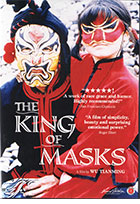
The King of Masks (original Mandarin Chinese title: Bian Lian) 1999 for international distribution with English subtitles. (The original Chinese production was completed in 1996.)
Distributed by First Run Features, 630 Ninth Avenue, Suite 1213, New York, NY 10036; 212-243-0600
Produced by Shaw Brothers (Hong Kong) and the Beijing Youth Film Studio (China)
Directed by Wu Tianming
DVD, color, 102 min.
High School - General Adult
Gender Identity, China, Art
Date Entered: 06/19/2015
Reviewed by Gary D. Byrd, University at Buffalo (SUNY)This historical drama, set in 1930s provincial Sichuan, focuses on the experiences of an elderly travelling street performer, Wang (played by Zhu Xu), known as the King of Masks for his talent in telling stories while switching silk facial masks with lightning speed, and a very young homeless girl (played by Zhou Ren-ying) who, through an unexpected series of circumstances, becomes his dependent nicknamed Doggie and protégé in this Sichuan Change Art. Changing masks becomes a recurring metaphor of the film since, as an 8-year-old girl with little value in 1930s China, Doggie must initially disguise herself as a boy to be accepted by Wang, who lost his wife and son years ago. A famous male performer of female roles in Chinese opera (played by the actual opera star Zhao Zhigang), who admires Wang’s talent and becomes his friend and supporter, also advises Wang to respect tradition and not die without a male heir of his silk mask art. The story’s drama centers on Wang’s discovery of Doggie’s real gender and the complications and dangers this revealed truth creates for both of them.
The performances are excellent and set in convincingly realistic historical costumes and settings, although as Roger Ebert noted in a 1999 review, the story (with its child changeling and ancient performance secrets) contains many elements of a fable. And although the themes of rural poverty and the mistreatment of children, especially girls, in this traditional Chinese culture are very serious and accurately portrayed, the film also uses tenderness and a great deal of humor to show the growing mutual respect and love that develops between this lonely, but talented and compassionate, old man and an abandoned, but bright and resourceful, child.
As the head of the Xi’an Film Studio in the 1980’s, the film’s director, Wu Tianming, nurtured the early careers of the “Fifth Generation” of Chinese filmmakers including Zhang Yimou, Chen Kaige and Huang Jianxin. He then spent a decade of exile in the United States following the Tiananmen Square revolt. The King of Masks was Wu’s first film after returning to China and, while not overtly political, the story does center on the conflict between traditional Chinese social values and the more modern, western individualistic values of human dignity and worth, irrespective of age and gender.
The film has been marketed for a general audience of adults interested in foreign art films, but it could also serve as a valuable educational resource for high school or college courses in Chinese language, culture and social values. In addition, other reviewers have suggested that bright, younger children (those able and willing to read the subtitles) would find this story featuring an 8-year-old girl heroine and a pet monkey to be engaging. From this reviewer’s perspective, this is doubtful, since the story’s drama is viewed primarily from an adult perspective and the subtitles change quickly and would be difficult to follow by any but the most exceptionally bright young children.
Awards
- Best Director, Best Actress and Best Leading Actor awards at the Zhuhai, Tokyo International, Singapore International, and Berlin International film festivals in 1996
- Audience Award at the 1997 San Francisco International Film Festival